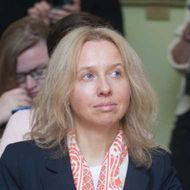- A
- A
- A
- ABC
- ABC
- ABC
- А
- А
- А
- А
- А
- HSE University
- Faculties
- Faculty of Humanities
- School of History
- News
- ‘Russia's Revolution in Regional Perspective’ Edited by Liudmila Novikova
105066 Moscow, Staraya Basmannaya 21/4, building 3
Phone: +7 (495) 772 95 90 *22858
The HSE School of History was established in 2015 on the basis of the HSE faculty of history. The School's staff brings together leading scientists in various fields of historical knowledge who are widely known and respected in Russia and the international academic community. The School’s instructors are leading historians are authors of numerous books and articles, regular participants in major international scientific forums and research projects, and are also known as popularizers of historical knowledge. The HSE School of History actively cooperates with leading foreign universities and research centers, and organizes international scientific conferences, symposia, and colloquiums.
 Principles and Forms of Sociocultural Organization: Historical Contexts of Interaction
Principles and Forms of Sociocultural Organization: Historical Contexts of Interaction
Gleb V. Aleksandrov, Bondarenko D. M., Anna K. Aleksandrova et al.
L.; NY: Anthem Press, 2026.
In press
Vestnik Sankt-Peterburgskogo Universiteta, Istoriya. 2026. Vol. -. No. -. P. -.
Anna K. Aleksandrova.
In bk.: Principles and Forms of Sociocultural Organization: Historical Contexts of Interaction. L.; NY: Anthem Press, 2026. Ch. 9. P. 177-197.
Kolesnik A., Rusanov A.
Working Papers of Humanities. WP. Издательский дом НИУ ВШЭ, 2021. No. 205.

‘Russia's Revolution in Regional Perspective’ Edited by Liudmila Novikova
The volume is titled ‘Russia's Revolution in Regional Perspective’ and dedicated to the understanding of the Russian Revolution through the detailed study of specific localities. Answering the important question of how locality affected the revolutionary experience, these essays provide regional snapshots from across Russia that highlight important themes of the revolution. Drawing on new empirical research from local archives, the authors contribute to the larger historiographic debates on the social and political meaning of the Russian revolution as well as the nature of the Russian state.
Russia’s Revolution in Regional Perspective highlights several important themes of the period that are reflected in this volume: a multitudinal state, the fluidity of party politics, the importance of violence as a historical agent, individual experiences, and the importance of economics and social forces. The bookreconceptualizes developments in Russia between 1914 and 1922 as a kaleidoscopic process whose dynamic was not solely determined in the capitals.
Liudmila Novikova, Associate Professor at the School of History and Deputy Director of the International Centre for the History and Sociology of World War II and Its Consequences, is an editor of the book.
For further information please visit the webpage.
Liudmila Novikova
- About
- About
- Key Figures & Facts
- Sustainability at HSE University
- Faculties & Departments
- International Partnerships
- Faculty & Staff
- HSE Buildings
- HSE University for Persons with Disabilities
- Public Enquiries
- Studies
- Admissions
- Programme Catalogue
- Undergraduate
- Graduate
- Exchange Programmes
- Summer Schools
- Semester in Moscow
- Business Internship
- © HSE University 1993–2026 Contacts Copyright Privacy Policy Site Map
- Edit



